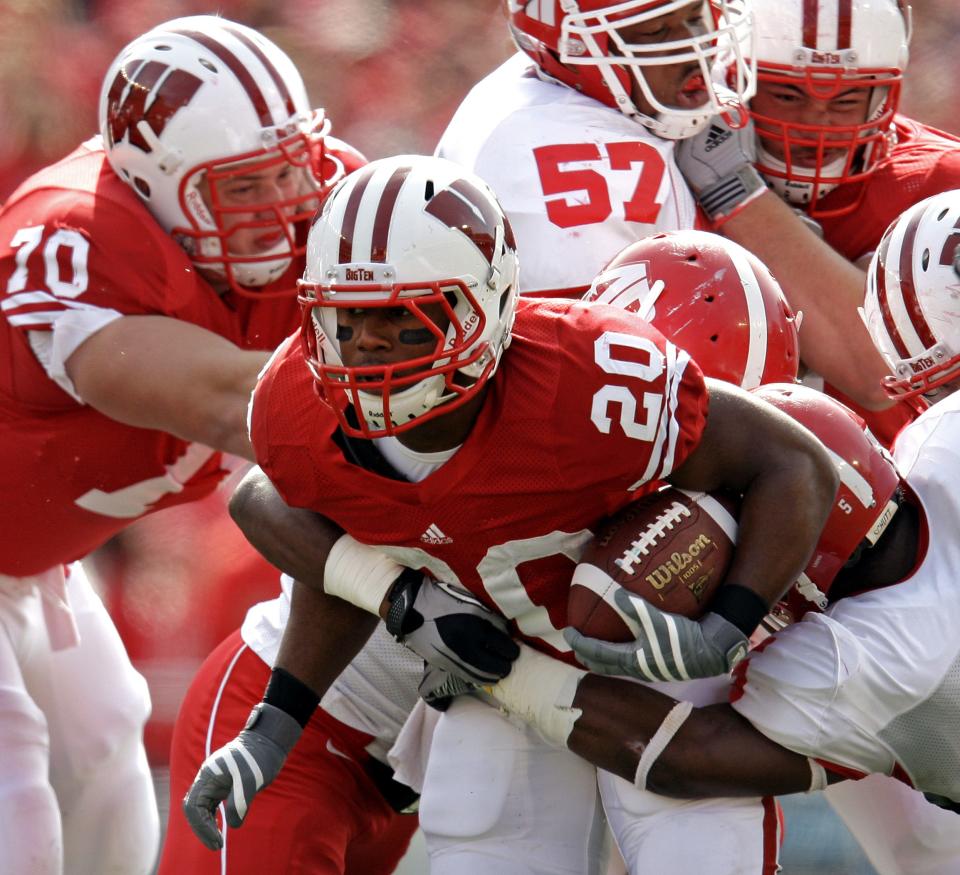This season, the College Football Playoff is expanding to a 12-team format, building on its previous four-team arrangement established in 2014.
The widened playoff pool allows for more schools to qualify for the postseason and relieves some stress throughout the regular season. Teams that have previously been eliminated for losing two games now can squeak into the postseason with three or four losses.
The University of Wisconsin could have benefited from the 12-team playoff format throughout its history. Since 1990, nine Badgers squads finished their seasons with a national ranking as low as No. 11 and as high as No. 4.
More: The most amazing play of the Wisconsin football season in 2023 wouldn’t count in 2024
After 2014, the prevailing rankings switched from the Associated Press to the College Football Playoff rankings.
What if the expanded playoff system had been established in the 1990s? Who would Wisconsin have matched up against? Could the Badgers have made a run to a national championship game? Is this all just an excuse to reminisce on previous great Badgers teams? Let’s find out.


1993
With 1990 as an arbitrary cutoff, the 1993 Badgers would be the first team to qualify under the new CFP rules. Head coach Barry Alvarez completely revitalized the program in his fourth season, taking a team that had finished 1-10 in 1990 and flipping it into a 10-1-1 juggernaut.
UW finished No. 6 in the last AP poll following a 21-16 victory over No. 18 UCLA in the Rose Bowl.
Alvarez’s first team with a positive win-loss record had one blemish. It fell 28-21 to an unranked Minnesota team that finished as the third-worst team in the Big Ten.
Wisconsin, despite the 10 wins, didn’t win the conference outright. It shared the title with Ohio State due to a 14-14 tie against the Buckeyes.
Based off the CFP format, the Badgers would have had a chance to decide the rightful winner of the conference with a first-round matchup against No. 11 Ohio State. Prior to their bowl game, the Buckeyes fell 28-0 to Michigan, a team that Wisconsin had beaten in the regular season 13-10.


1998
Five years later, Alvarez guided another UW team to a No. 6 ranking in the final AP poll. These Badgers went 11-1, with a sole loss to No. 12 Michigan.
Like the ’93 team, UW faced UCLA in the Rose Bowl. They defeated the Bruins again, 38-31, courtesy of a 246-yard, four-touchdown performance from running back Ron Dayne.
That season, Dayne rushed for 1,279 yards and 11 touchdowns. In 1999, he would win the Heisman Trophy, then joined the New York Giants as the 11th pick in the 2000 NFL draft.
With their first-round pick in 2001, the Miami Dolphins selected Dayne’s teammate, Jamar Fletcher. Fletcher, a defensive back, recorded six interceptions in 1998. In 2000, he won the Jim Thorpe award, which recognizes the best defensive back in college football.
Quarterback Mike Samuel often found future Pro Bowl receiver Chris Chambers, who totaled 26 catches, 537 yards, and seven touchdowns. The Dolphins dipped into the Wisconsin well twice in 2001 by drafting Chambers in the second round.
Texas A&M ended the ’98 season as the No. 11 seed, making them Wisconsin’s hypothetical opponent. The Aggies had an 11-3 record with losses to No. 2 Ohio State, No. 3 Florida State and No. 15 Texas. The Aggies defeated No. 10 Kansas State in the Big 12 championship game, No. 19 Nebraska and No. 21 Missouri.
1999
Alvarez and the Badgers kept the good times rolling in 1999 as they pulled off arguably their best season in recent history. Wisconsin went 10-2 with multiple wins over ranked opponents.
The Badgers handily defeated No. 7 Michigan State 40-10, scraped past No. 18 Minnesota 20-17 in overtime and bested No. 25 Purdue 28-21.
UW lost to No. 5 Michigan 21-16, but still secured the Big Ten title. Its other loss was an ugly 17-12 defeat at the hands of unranked Cincinnati.
The AP placed Wisconsin No. 4 in its final poll, which would have given the Badgers a first-round bye. They would have played the winner between No. 5 Michigan and No. 12 Florida.


2006
At the end of the 2005 season, Alvarez stepped away from his 16-year coaching career at Wisconsin. In his stead, Bret Bielema powered the Badgers to a 12-1 record, good enough for the No. 7 seed in the AP rankings.
UW would have challenged the Buckeyes for the conference title had it not been for a 27-13 loss to No. 8 Michigan early in the season.
Although the Badgers did not compete for a conference title, they accepted a 17-14 consolation win over No. 15 Arkansas in the Capital One Bowl.
As the No. 7 seed, Wisconsin would have played No. 10 West Virginia, which went 11-2 in 2006 with a signature win over No. 12 Rutgers in a 41-39 triple-overtime thriller.
The Mountaineers hung around with, but could not defeat, No. 6 Louisville, but they also lost to unranked South Florida.


2010
Four years later, and with Bielema still at the helm, UW returned to the No. 7 seed with an 11-2 record. Beating Ohio State and Michigan in the same year and sharing a conference title with…
Milwaukee Journal Sentinel







